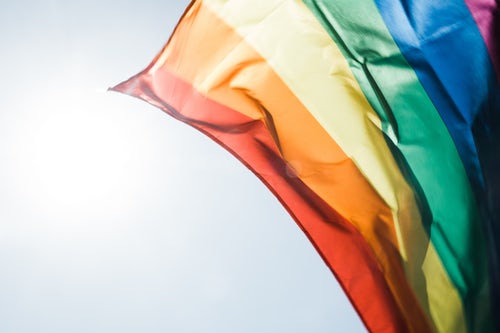How easy do you find university? Are you living a different life at university than you do when you visit home, because you don’t feel your family will understand who you are? Many people feel they can’t be truly honest with their families, out of fear they won’t be accepted due to societal norms and ignorance. Members of the LGBT+ community may often be in this position, living a lie to those they love through fear of being rejected by friends and family. In this blog, Luc shares their university experience as a nonbinary transgender student.
The most dreaded part of any LGBT+ persons life is coming out to the people in their lives, especially someone close, such as a parent or partner, and it may seem as though things are bleak for the queer community, however more and more young people are gaining the confidence to come out as we are being accepted by more of society. My name is Luc (pronounced “Luke”), I am nonbinary, my pronouns are they / them / he / him, and in 2015 I came out as transgender to my family and it went … poorly to say the least. As I’m guessing some people reading can relate, my mum didn’t understand and did the whole “WHAT DID I DO WRONG AS A PARENT???!!!!” thing and it sucked, but at the same time I was living my absolute best life away from home at university.
I studied Costume Design at Arts University Bournemouth, and with my family living in Dunstable, I couldn’t go home whenever, so this allowed me to live as the person I felt I was, instead of an anxiety riddled mess who was terrified of being misgendered and dead named 24/7. As soon as I left home and was away from the place I felt trapped in, I introduced myself as Luc to everyone I met, and although my birthname was on all the documents, most if not all the people I met on my course respected me and my pronouns. This was liberating but I was always on edge when filling in forms / in meetings / at the doctors ect, so when I went to the university counsellor, due to other reasons, he allowed me to change my name on the systems, which helped tremendously.
For the last few years it’s felt as though I’ve lead a double life of being Luc at university and around my friends, and Eriqua everywhere else, but having a safe and secure group of friends, some of whom are also trans, helped a lot with figuring things out and reassuring me that Yes I Am Trans And That’s Ok, which sometimes trans people need. These people have helped me through my darkest times at university and have backed me up when tutors ask after me using my birthname and calling me Luc in front of tutors and others, which solidified my name change and made me feel validated. This reached my course leader who, when I explained the situation, agreed for me to have my changed name on exhibition boards and my work spaces, even though she didn’t fully get it on a personal level.
Being nonbinary at university I can give a few pieces of advice;
- It doesn’t matter if you don’t “pass” as a certain gender. Passing isn’t everything and you will spend this time developing your style and growing, even if it doesn’t feel like it.
- Find yourself a group of friends that accept you for who you are. If your friends are rude, horrible, disrespectful about the issues your facing, I’m sorry but you need to get as far away from them as possible.
- Universities are a very diverse place and WILL have somewhere you can go and people you can talk to if you feel unsafe, or just need a chat about things, whether it be your course tutors, a university counsellor or doctor.
- Find the LGBT+ societies. At my university, we had an LGBT+ Society, and the Trans and Nonbinary Society, where we could all talk and be in a safe place around other queer people.
After finishing uni, I realised how much I had grown, and how much I have changed since when I started with becoming confident with the way I look, being a fat femme nonbinary person who wears makeup and doesn’t bind due to health issues, and although the fear and anxiety is still there, I still introduce myself as Luc and let people know that I am a trans person and if you don’t respect that then sorry but I don’t want anything to do with you.
If you, or someone close to you, has come out, or is anxious about finding LGBT+ safe spaces as a student, there WILL BE places at your universities, and if there isn’t then there will always be people in the same position to help create these places and societies ect. I also found groups on Facebook to join with other LGBT+ people at my uni who were amazing and helped everyone, and gave everyone support in their journeys, and remember that this is a time that you will grow and learn so much about yourself and the world around you if you haven’t already. Don’t force yourself to come out when you weren’t ready like I was, find supportive people who you can fall back on if you’re unsure of the reactions and take the time you have away from home to enjoy yourself and have fun creating your own identity.
WORD MEANINGS
TRANSGENDER / TRANS – Someone who doesn’t identify with the sex they were given at birth
CISGENDER – Someone who does identify as the sex they were given at birth
NONBINARY – A trans person who doesn’t identify with the gender binary of strictly male and female
LGBT+ – Lesbian, gay, bisexual, transgender, and any other identifier for people who aren’t cisgender and heterosexual (cishet)
QUEER – A slur used against the LGBT+ community that some people in the community use for empowerment (DO NOT USE IF YOU ARE A CISHET)
GENDER DYSPHORIA / FEELING DYSPHORIC – Dysphoria is a sense of unease, distress, and / or anxiety due to a persons gender identity and the sex they were identified at birth
MISGENDERING – Using the wrong pronouns when talking to / about a person e.g. “I was with HIM at the time” when talking about a transwoman who uses “she / her” pronouns
DEADNAMING – Using a trans persons birth name instead of their chosen name and can be extremely harmful for the person
BINDING / TO BIND – Binding is the act of compressing the chest to make it seem flatter. Trans people will use this to help manage their dysphoria








